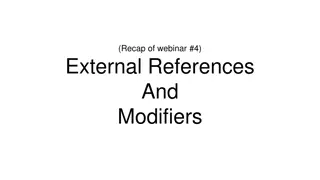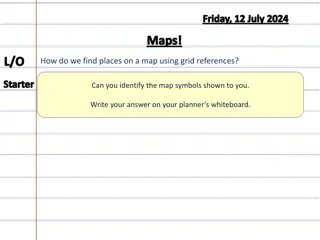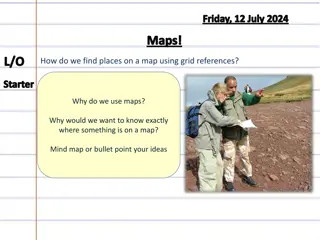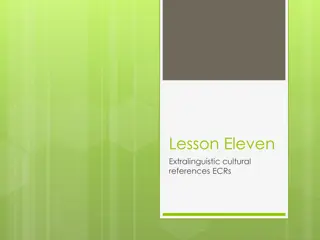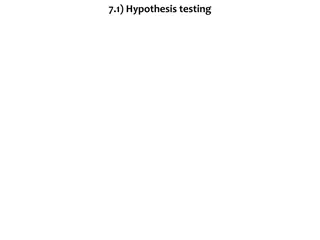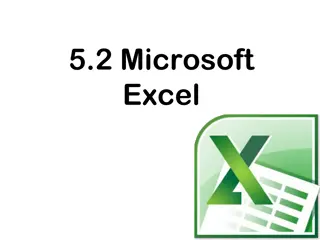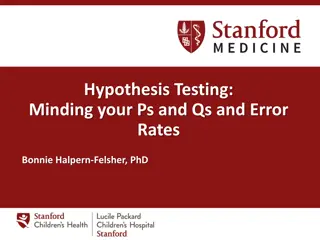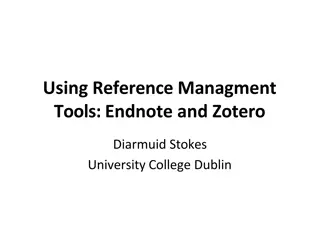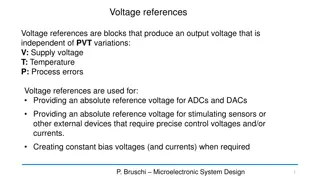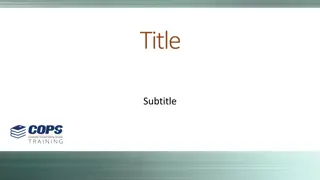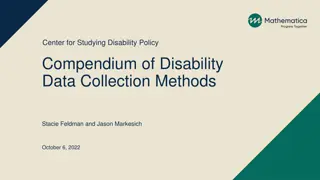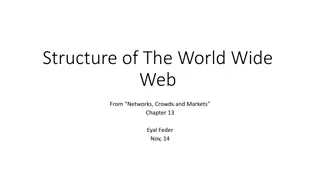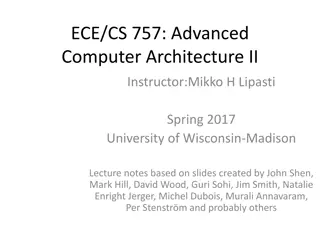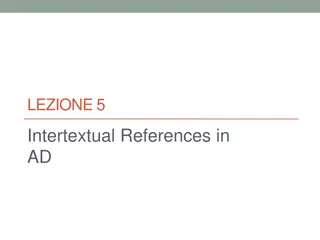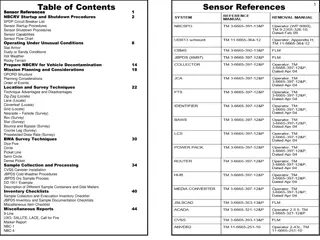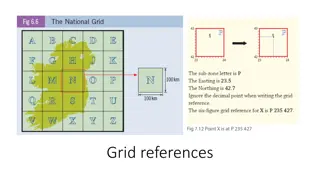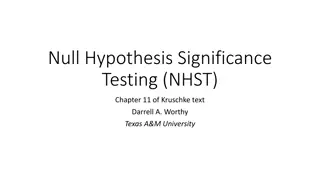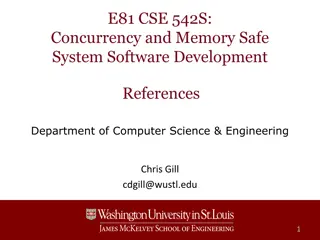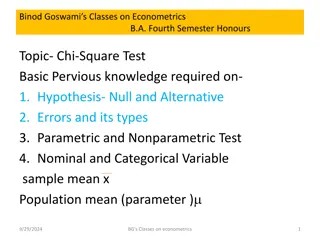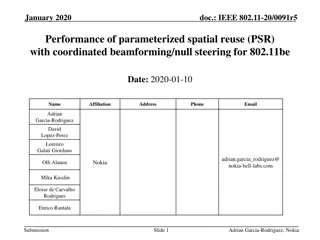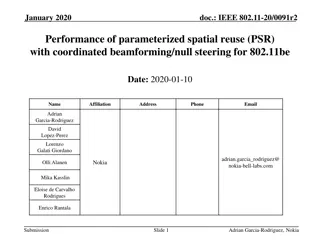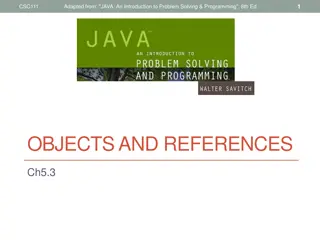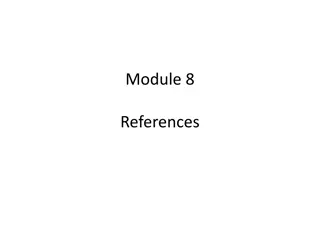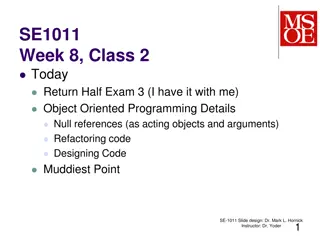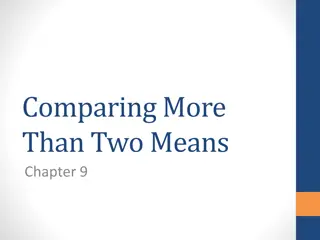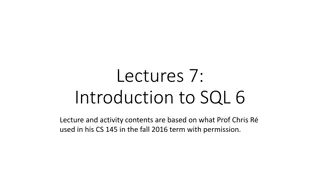Understanding External References and Modifiers in Provider Networks
Exploring the intricate details of external references, providers, and negotiated rates within provider networks. Learn about in-network files, iterative development, and the nuances of Medicare plans. Uncover the complexities of provider group IDs, negotiated prices, and in-network locations.
1 views • 28 slides
Mastering Map Grid References for Accurate Location Identification
Learn how to find places on a map using grid references. Discover how to identify map symbols and determine accurate six-figure grid references. Follow step-by-step guidance to pinpoint locations with precision on maps. Enhance your mapping skills and boost your navigational expertise efficiently.
0 views • 18 slides
Understanding Grid References on Maps
Learn how to find places on a map using grid references, the importance of knowing exact locations on a map, and practice identifying 4-figure grid references independently. Discover how grids on maps help in quickly locating places and memorize the process with the mnemonic "Along the corridor and
0 views • 9 slides
Understanding Type I and Type II Errors in Hypothesis Testing
In statistics, Type I error is a false positive conclusion, while Type II error is a false negative conclusion. Type I error occurs when the null hypothesis is incorrectly rejected, leading to a conclusion that results are statistically significant when they are not. On the other hand, Type II error
0 views • 6 slides
Understanding Extralinguistic Cultural References (ECRs) in Subtitling
Exploring the concept of Extralinguistic Cultural References (ECRs) in subtitling, this lesson delves into how ECRs are defined, accessed, and rendered in subtitles. It discusses strategies such as retention, direct translation, official equivalents, and interventional approaches like generalization
0 views • 14 slides
Understanding Cell References in Spreadsheets: Absolute vs. Relative
Learn the difference between absolute and relative cell references in spreadsheets through practical examples and visual aids. Explore how to model data effectively, create spreadsheets, and use pie charts for result comparison. Get hands-on with homework tasks to enhance your skills further.
3 views • 27 slides
Understanding Hypothesis Testing and Null vs. Alternative Hypotheses
A hypothesis is a prediction about a study's outcome, guiding research direction. Stating hypotheses forces deep thinking and making specific predictions but may introduce bias. Null hypothesis (H0) states no effect, while alternative hypothesis (Ha) claims an effect in the population. Researchers e
0 views • 7 slides
Hypothesis Testing Examples and Scenarios
Explore various scenarios involving hypothesis testing, including coin bias, dice rolling, and election candidate support estimation. Learn to define test statistics, null and alternative hypotheses, select significance levels, and determine conditions for rejecting the null hypothesis based on samp
0 views • 9 slides
Mastitis Control on Dairy Farms: References and Further Reading
This collection of references provides valuable insights into the incidence, aetiology, and management of mastitis on dairy farms in the UK. The references cover various aspects of mastitis, including antimicrobial use, vaccination efficacy, dry period infections, and herd management practices. The
1 views • 5 slides
Mastering Microsoft Excel Basics
Explore the essential components of Microsoft Excel, from identifying main parts of the window to performing basic mathematical operations and understanding cell references. Learn how to navigate through the interface, work with commands on the menu bar, and utilize various options for entering, edi
0 views • 31 slides
Analysis of Vance Joy's "Riptide" Music Video and Intertextual References
Australian singer-songwriter Vance Joy, signed to Atlantic Records, released "Riptide" as his first single in the USA, known for its unique music video style. The video, directed by Dimitri Basil and Laura Gorun, has garnered over 250 million views on YouTube. This analysis delves into the economic
3 views • 7 slides
Understanding Hypothesis Testing in Statistics
Hypothesis testing is essential in scientific inquiry, involving the formulation of null and alternative hypotheses at a chosen level of significance. Statistical hypotheses focus on population characteristics and are tested on samples using probability concepts. The null hypothesis assumes no effec
0 views • 26 slides
Comparing EndNote Web and Zotero Reference Management Tools
Reference management software like EndNote Web and Zotero offer scholars and authors the ability to record and use bibliographic citations effectively. These tools enable easy collaboration, sharing of references, and curating collections of references. While EndNote Web is widely used and integrate
0 views • 22 slides
Understanding Grid References for Map Navigation
Learn about grid references on maps, including northings and eastings, how to find specific locations using grid references, and practice exercises with answers provided. Enhance your map-reading skills with this informative guide.
1 views • 7 slides
Understanding Band-Gap Voltage References in Microelectronic Systems
Voltage references provide stable output voltages unaffected by variations in supply voltage, temperature, and process errors. This summary delves into the principles of band-gap voltage references and their crucial role in creating precise control voltages for ADCs, DACs, and various other applicat
1 views • 14 slides
Community-Oriented Policing Services Project Summary
This project, supported by cooperative agreement number 15JCOPS-2#-GG-XXXXX-XXXX from the Office of Community Oriented Policing Services, U.S. Department of Justice, discusses the author(s)' opinions on community policing. Disclaimer: The views expressed are those of the author(s) and not necessaril
0 views • 4 slides
Center for Studying Disability Policy Compendium: Data Collection Methods
This compendium provides a comprehensive overview of collecting data on people with disabilities, featuring 554 indexed references since 2012. It aims to fill knowledge gaps, serving as an up-to-date and accessible resource released annually. The development process involves obtaining diverse refere
0 views • 11 slides
Understanding the Structure and Evolution of the World Wide Web
Exploring the intricate network of the World Wide Web, this content delves into its origins, the distinction between the web and the internet, the concept of information and social networks, and the fundamental role of hypertext. It also discusses different methods of organizing information and high
4 views • 37 slides
Memory Consistency Models and Sequential Consistency in Computer Architecture
Memory consistency models play a crucial role in ensuring proper synchronization and ordering of memory references in computer systems. Sequential consistency, introduced by Lamport in 1979, treats processors as interleaved processes on a shared CPU and requires all references to fit into a global o
1 views • 64 slides
Excel Computing Challenge: Cell References and Spreadsheet Formatting
Dive into Miss Pettitt's Excellent Excel Computing Challenge and learn about cell references for fruits like orange and apple. Explore spreadsheet formatting by changing font colors, adding borders, adjusting font sizes, and more. Put your skills to the test and see how well you can format the data
0 views • 5 slides
Understanding Intertextual References in Visual Media
Intertextual references are elements in texts, including films and TV programs, that connect to other texts, shaping viewers' understanding. These references can be subtle or deliberate, adding layers of meaning and intellectual pleasure for viewers. While sighted audiences can easily recognize thes
0 views • 37 slides
Sensor References and Procedures for NBCRV Operations
This document provides a detailed guide on sensor references, startup, and shutdown procedures for the Nuclear, Biological, and Chemical Reconnaissance Vehicle (NBCRV). It includes information on various sensors, deployment techniques, operating under different conditions, and mission planning consi
0 views • 25 slides
Coastal Challenges: Threats and Uses Analysis
The Year 9 Geography homework booklet focuses on the topic of coasts, emphasizing grid references and mapping skills. Students are tasked with identifying grid references for shapes, drawing specific shapes on grids, and demonstrating understanding of 4 and 6 figure grid references. Additionally, in
0 views • 13 slides
Grid References and Archaeological Sites Answer Key
This content provides answers to grid references for various archaeological sites, including a four-figure grid reference and a six-figure grid reference. The images and descriptions help in understanding the locations of sites like Holy Well, Cairn, Megalithic Tomb, Standing Stone, and more. The so
0 views • 5 slides
Unveiling The Matrix: Deconstructing Cultural References and Critical Analysis
Explore the intricate layers of cultural references, vocabulary, literary allusions, and critical evaluation within "The Matrix" through an in-depth analysis. Delve into the film's visuals, themes, and characters to unravel its cinematic and philosophical excellence.
0 views • 21 slides
Understanding Null Hypothesis Significance Testing (NHST) in Statistics
Null Hypothesis Significance Testing (NHST) is a common method in statistics to determine if a particular value of a parameter can be rejected, such as testing if a coin is fair. This involves calculating probabilities of outcomes and p-values to make decisions. The process relies on defining spaces
0 views • 37 slides
Understanding Citations in Academic Writing
Citations play a crucial role in academic writing by distinguishing between original and borrowed text. The slides provide insights into the importance of citations, their types, and how to create a list of references following the APA style. Clear distinction between personal insights and external
0 views • 37 slides
Rust References and Memory Safety in System Software Development
In Rust programming, references play a crucial role in ensuring memory safety and concurrency. Understanding concepts like owning pointers, shared vs. mutable access, working with references, and reference handling is vital for developing robust and secure system software in Rust. The language enfor
0 views • 9 slides
Coordinated Beamforming/Null Steering Protocol in IEEE 802.11be
Coordinated beamforming/null steering is a promising scheme in IEEE 802.11be for joint transmission/reception challenges. This protocol aims to efficiently realize gains by establishing semi-static inter-AP coordination, enhancing spatial reuse opportunities, implementing CSI acquisition, and managi
0 views • 15 slides
Coordinated Null Steering for Enhanced Wireless Communication
Null steering in wireless technology allows devices to place spatial radiation nulls towards non-served STAs for interference suppression, improving spatial reuse and mitigating inter-cell interference. This document discusses null steering-related proposals in EHT, including challenges, benefits, a
0 views • 16 slides
Herding Nulls and Other C# Stories From the Future
Explore the challenges of dealing with nulls in C#, including expression of intent, enforcement mechanisms, and solutions to ensure null safety within the existing language. Learn how to differentiate between nullable and non-nullable types, protect non-null types from nulls, and strike a balance be
0 views • 16 slides
Understanding Hypothesis Testing and Types of Errors in Econometrics
Hypothesis testing is vital in econometrics to evaluate statements about population parameters. The null hypothesis assumes no difference, while the alternative hypothesis offers a different perspective. Different types of errors—such as Type I and Type II errors—can occur during hypothesis test
1 views • 11 slides
Performance Evaluation of Parameterized Spatial Reuse with Coordinated Beamforming for IEEE 802.11be
The study focuses on assessing the performance of parameterized spatial reuse (PSR) with coordinated beamforming/null steering for IEEE 802.11be. The framework allows coordinated sharing of uplink transmission opportunities among APs, demonstrating gains in synchronous coordinated beamforming system
0 views • 19 slides
Performance Evaluation of Coordinated Beamforming with Parameterized Spatial Reuse in IEEE 802.11be
The document discusses the performance evaluation of coordinated beamforming with parameterized spatial reuse (PSR) in IEEE 802.11be. It explores the practical operation of the 802.11ax PSR framework with null steering and the key implementation benefits, emphasizing unsynchronized operation and ada
0 views • 20 slides
Intertextual Examination of Big Issue Covers
Explore the intertextual references in two Big Issue covers - one referencing Punk British identity with Banksy and Nevermind the Bollocks, and the other featuring Office Christmas parties with references to Ruth Wilson, David Schwimmer, Ozzy Osbourne, and Jeff Goldblum. Analyze how these references
0 views • 6 slides
Understanding Objects and References in Java Programming
Exploring the concept of objects and references in Java programming, this content delves into variables of a class type, memory management, and the behavior of class variables. It discusses how variables store memory addresses and highlights the efficiency of handling class types through references.
0 views • 18 slides
Understanding Perl References and Pointers in High-Level Languages
Explore the concept of references in Perl, similar to pointers in languages like C and C++. Learn how references allow you to work with memory addresses and change variable values efficiently. Discover the basics of creating, using, and dereferencing references in Perl programming.
0 views • 24 slides
Object-Oriented Programming: Class 2 Recap and Muddiest Points Discussion
Today's class delved into object-oriented programming, null references, refactoring code, and designing code. We reviewed static classes and discussed the ins and outs of using "this" and "other" in programming. The muddiest points included understanding the behavior of null objects, short-circuit o
0 views • 9 slides
Simulation-Based Tests for Comparing Multiple Means
Simulation-based tests provide a method for comparing multiple means by assuming no association between explanatory and response variables. Null distributions are created by shuffling data and calculating differences in means. The observed differences in sample means are then compared to the null di
0 views • 45 slides
Understanding SQL Concepts: Quantifiers, NULLs, and Handling Null Values
Dive into the world of SQL with this content, covering essential concepts such as quantifiers, NULLs, and how SQL handles null values. Explore topics like existential and universal quantifiers, handling NULL values in numerical and boolean operations, and understanding the behavior of NULL values in
0 views • 18 slides
